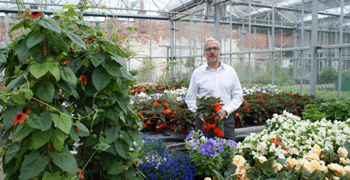Mental health and the gardening industry by Neville Stein

During the Covid-19 pandemic, main stream media has been promoting the message that us seasoned horticulturalists have known for a very long time – gardening is good for you! Most of us that have been knocking around this wonderful industry for either years or months will know that spending time with plants is good for physical health, and can significantly contribute to mental health and well-being. It was therefore really encouraging and positive to see that during the recent mental health awareness week the focus was on connecting with nature.
This coupled with the new mental wellbeing campaign from Perennial, the horticultural industry’s charity, means that the subject of mental health is firmly on the agenda as a common and mainstream issue concerning us all. And yes, it does concern us all, particularly when one considers that, according to Perennial, one in four people working in or retired from horticulture are likely to experience mental health problems. The work and contact with nature is beneficial, but sometimes other factors at play in work or home life can cause stress, distress, and depression. Having the benefit of working with nature doesn’t mean we are immune to other pressures that disturb and affect our mental health!
How then can we respond as an industry and play our part in helping those we work with, connect with, or supply, in developing mental resilience. Well perhaps the first approach is to capitalise on the friendly and supportive nature that exists - if you have had mental health issues and feel up to sharing those with your colleagues or customers – do so. You will be surprised how many share your experiences. Let’s not be afraid to talk about how we feel, the challenges we are facing, and how we are coping with what is becoming a stressful and uncertain industry. If you feel you can’t do that in your work environment, try to think of ways the culture can be changed. Challenging a non-supportive environment can be hard, but it is possible if you can start first with changing your own approach and behaviour – something for another blog perhaps!
The second way to help is to be alert to those in your workplace or those that your meet in your supply chain who are showing signs of mental health issues. I recently qualified as a mental health first aider – it’s the equivalent of being a physical first aider – and this course has enabled me to be aware of the symptoms of emotional and mental health distress, and how to help people. So, like every workplace should ideally have trained first aiders, let’s now add mental health first aiders into the workplace. There is an excellent course available from The Mental Health Foundation, but if you don’t feel this is for you, at least take the opportunity to sign post people to the excellent work that Perennial and The Farm Crisis Network are doing in supporting those in our industry suffering with mental health issues.
I also believe that the media coverage of the importance of garden centres as a contributor towards our wellbeing presents our industry with a wonderful opportunity. Wouldn’t it be great if everyone in the supply chain could develop a generic consumer campaign, promoting the mental wellbeing that one gets from gardening? It would drive footfall into garden centres, and increase the sales of plants, but it would also establish gardening as a main stream activity amongst a new demographic – millennials and Generation Z, some of whom are just beginning to experience the joys of gardening. It would be a real win-win for the business sector and customer alike.
Right now we have a fantastic opportunity to make and retain lifelong customers from this younger generation, many of whom have a proactive and principled interest in their own mental health and welfare, nature, and the environment. Nature is a therapy, and we can provide the couch! How wonderful to be able to make a living while helping others live better themselves.
